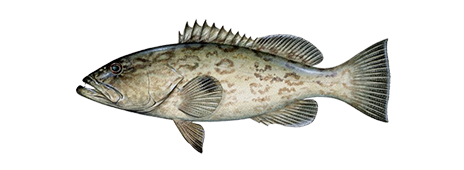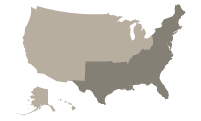
Gag Grouper
Like many fish species in the wrasse family, young gag grouper are predominantly female, transforming into males as they grow larger.

Region
South, Northeast
Catch ease
Medium
Habitat
Bay, Ocean
HOW TO IDENTIFY A GAG GROUPER
The coloration of this species is extremely variable but generally brownish gray overall with a pattern of dark, worm-like or kiss-shaped markings along the sides. Gags can be distinguished from black grouper, Mycteroperca bonaci, that often occur in the same habitat by the distinctive color pattern and the shape of the preopercle (the middle bone of the gill cover). The gag has a noticeably notched preopercle with a distinct lobed appearance while black groupers have an evenly rounded preopercle with no definite lobe below.
WHERE TO CATCH GAG GROUPER
The distribution of the gag grouper extends in the western Atlantic from North Carolina, USA (with juveniles occurring as far north as Massachusetts) to Yucatan Peninsula, Mexico; it is rare in Bermuda and absent from the Caribbean and Bahamas. Gags are the most common grouper on rocky ledges in the eastern Gulf of Mexico. Juvenile gags reside in estuaries and seagrass beds while adults are usually found offshore on hard substrate in water depths of 60-250 feet (rarely to 300 feet) and occasionally inshore on rocky or grassy bottom. Adults are either solitary or found in groups of five to 50 individuals. The following list includes additional details on where to catch this fish:
| BAYS AND ESTUARIES |
| JETTIES AND BREAKWATERS |
| NIGHT FISHING |
| ROCKY SEA FLOOR |
| COASTAL WATERS |
| MAN-MADE STRUCTURES |
| REEFS, WRECKS, AND SHOALS |
HOW TO CATCH GAG GROUPER
Bottom fishing is the most effective method of catching gag grouper. Anglers commonly use depth sounders to locate rocky outcrops and irregular bottom where gags congregate, anchoring when a likely area is located. Wrecks and oil rigs in shallow shelf waters of the Gulf also attract many gag grouper. Trolling lipped diving plugs in shallower areas of rocky bottom or reef is also a very effective method to catch these fish. They are an excellent light-tackle target for those fishing relatively shallow waters and the white flaky flesh of this species makes it an excellent eating fish. The following are fishing methods used to catch this fish:
| DRIFT FISHING |
| BOTTOM BOUNCING |
| SALTWATER TROLLING |
| CHUMMING |
| STILL FISHING |
| SALTWATER JIGGING |
GAG GROUPER LURES, TACKLE & BAIT
The following are lures, tackle or bait that can be used to catch this fish:
| CUT BAIT |
| PLUGS |
| SHRIMP |
| JIGS |
| SALTWATER LIVE BAIT |
| SQUID |
BACK TO FISH SPECIES EXPLORER
